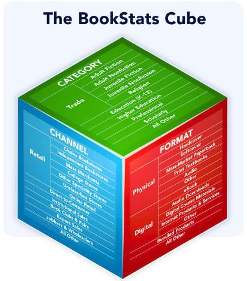 The tenth annual Making Information Pay (MIP) conference ran under the banner “Data. Information. Knowledge. Wisdom.” This annual, half-day conference from the Book Industry Study Group encouraged attendees to use data to make business decisions, a notion that BookNet firmly believes in and advocates.
The tenth annual Making Information Pay (MIP) conference ran under the banner “Data. Information. Knowledge. Wisdom.” This annual, half-day conference from the Book Industry Study Group encouraged attendees to use data to make business decisions, a notion that BookNet firmly believes in and advocates.
Market Data & Market Research
Some of the data that was explored can be found in BookStats, a collaborative project between the Association of American Publishers and BISG. Ned May, Vice President and Practice Leader of Outsell Inc., gave us a look at the latest publication from BookStats, highlighting data that addressed the question on everyone’s minds: What about digital?
According to BookStats, ebooks made up 20% of trade book sales in the US in 2012, up from 15% ($995 million in revenue) in 2011. The total US book sales for the year were $27.1 billion. According to the data, prices are fairly stable, ebook growth has slowed but contributes significantly to book sales overall, and both romance and YA are growth genres. Also, although ebook adoption in the US has slowed, the BRIC countries are showing rapid growth.
Len Vlahos, the Executive Director of BISG, shared data from their digital consumer panel, which they’ve been fielding for four years now. Some of the helpful US data coming out of this research shows that power consumers prefer their dedicated e-readers to tablets although more consumers are definitely using their tablets for reading. The age demographic of the power consumer is older now, but still female. On the whole, the digital consumer is beginning to look a heck of a lot like the traditional print book consumer.
Big Data
Hilary Mason, Chief Scientist at URL-shortening service bitly, highlighted the importance of “big data”— defined as the ability to ask a question and being able to process enough data quickly enough to get an answer back before you forget why you asked the question.
According to Mason, bitly is responsible for 30% of all links on Twitter. What this means is that bitly has data to cruch that can help them understand a lot about human social interaction. What people share publicly and what they click on privately can reveal a lot about their identity, and the way links are used can shed light on how and why certain items go viral.
Mobile
Almost all the speakers beat the mobile drum, but nothing made more waves than the data Ashleigh Gardner shared about Wattpad. An incredible 80% of the site’s traffic comes through mobile devices.
Gardner’s presentation really highlighted the success of Wattpad, showing off the startup’s willingness to experiment and find opportunity with authors like Paulo Coelho, Amanda Hocking, and of course their very own Wattpad fairy godmother: Margaret Atwood. Some authors are using analytics to improve their success. For example, Jon Evans tweaks his chapters to address bounce rate, and discovered that if people make it to chapter 3, they’re engaged.
Wisdom
“We spend our time responding rationally to a world which we understand and recognize, but which no longer exists.” – Eddie Obeng
 BISG Chair Ken Michaels, President and COO of Hachette Book Group, wrapped up the conference with Obeng’s message about change. Michaels presented the audience with the classic optical illusion of two lines that appear to be different lengths but are actually the same. He asked us whether the lines were different lengths, and the group, having seen the trick innumerable times before, all smugly called out that they were the same. But in fact, Michaels had tricked us—the lines he showed us were actually different lengths, and in our hurry to show that we knew that trick, nobody had taken the time to take in the reality of what we were looking at.
BISG Chair Ken Michaels, President and COO of Hachette Book Group, wrapped up the conference with Obeng’s message about change. Michaels presented the audience with the classic optical illusion of two lines that appear to be different lengths but are actually the same. He asked us whether the lines were different lengths, and the group, having seen the trick innumerable times before, all smugly called out that they were the same. But in fact, Michaels had tricked us—the lines he showed us were actually different lengths, and in our hurry to show that we knew that trick, nobody had taken the time to take in the reality of what we were looking at.
The trick was a great demonstration of the value of taking the time to truly analyze all of the data we have available to us. As the industry changes, the data lets us see how consumers are behaving, and track what we’re doing that works and that doesn’t. With the right tools, we can use data to see through the illusions of business-as-usual, and make decisions that benefit the industry.


